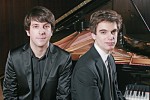Title
A life dedicated to music, despite its ostensibly public aims, can sometimes take monastic form. When industrialization ushered in a new secular order more than two centuries ago, aesthetics became the new religion, with music and its practitioners assuming new roles. The creators of musical works—composers—accommodated by refashioning their identities as self-appointed gods, while performers suddenly found their status relegated to spiritual servants. In this scheme, the pianist’s dilemma can be acute: how can the otherworldly creations of these divine geniuses be manifested in the physical world? It’s little wonder, then, that pianists sometimes respond by locking themselves away in the quest for transcendence, but Juilliard exists as an intermediary, fetching them from their private nests and offering their fruits for public consumption. The annual Gina Bachauer Piano Competition, now in its 35th year, exemplifies this process. On September 21, this year’s Bachauer winners, Oskar Jezior and Andrew Tyson, will present a joint program of Scarlatti, Szymanowski, Chopin, and Franck in Paul Hall.
Body
Tyson, 24, and a native of Durham, N.C., is scheduled to complete his master’s this spring. He is in the studio of Robert McDonald, with whom he studied first at the Taos School of Music and whom he describes as “an incredibly magnanimous musician, teacher, and person” with “simply amazing ears.” Tyson will open his segment with a short Chopin mazurka, a work intended by the composer to be heard in only the most intimate of gatherings. In a recent interview with The Journal, Tyson confessed to holding “what promises to be a long-term obsession with the mazurkas,” a collection of gems that early Chopin biographer James Huneker described as “dances of the soul.” Tyson envisions this soul “as a kind of dark and mysterious thread of strangely shifting harmonies, poetic ornamentation, and almost impalpable rhythms.” After revealing a portion of Chopin’s most private thoughts, Tyson will segue to a work more tailored for public display: Franck’s brooding Prélude, Choral et Fugue.
For his half of the concert, Jezior, who grew up in Warsaw, Poland, and is also scheduled to complete his master’s degree this spring, has conceived a program similar in structure to Tyson’s. Opening with Domenico Scarlatti’s pensive D-minor Sonata, K. 213, a work that, like Tyson’s mazurka, belongs more to the drawing room than the concert hall, Jezior will then present the Theme and Variations from the Second Sonata of fellow Pole Karol Szymanowski. This work also resists public performance, but for a more practical reason. As Jezior, 26, said in an interview with The Journal, the sonata “borders on the unplayable” but contains “some of the most bombastic and titillating piano music ever produced.”
Jezior studies with Matti Raekallio, with whom he also worked at the Hochschule für Musik, Theater und Medien in Hannover, Germany. Raekallio “is one of those very few teachers who try to come up with ideas that actually suit their student’s musical personality instead of just forcing their ideas on them,” Jezior said. “He’s also quite eager to pave the way for interpretations that are off the beaten path.”
The performance, to be broadcast live on WQXR, is not the only spoil awarded to the two victors of the Bachauer competition. Both pianists will also receive a full-tuition scholarship for the upcoming year—a welcome relief given the amount earned by most classical musicians per hour of practice-room labor (hint: it is less than minimum wage). As Juilliard President Joseph W. Polisi wrote in his book The Artist as Citizen, “a career in the performing arts will demand everything of you, never promising an equal return on your investment of time and energy” and leaving “little time to concern oneself with personal happiness.”
But for Tyson and Jezior, the pianist’s subservient position may paradoxically contain the means for artistic independence. “An honestly conceived and executed interpretation should always be the priority of a true artist, whereas success and popularity should be secondary to artistic integrity,” Jezior said, referring to the artistic challenges posed by competitions. “There is nothing more crushing than being thrown out of a competition after desperately having tried not to offend the jury members’ ears.” Being “true to the work” can mean being true to oneself, and not beholden to the influences of public opinion.
Meanwhile Tyson escapes his chains by humanizing his materials. “For me, the search for those lofty ideals is first and foremost an internal one which shouldn’t necessarily depend on environment. And yet, we know that human beings produced this music,” he said. “As soon as Beethoven becomes a human with a soul and human emotions, the search inward for those same deep feelings within ourselves can begin.”





